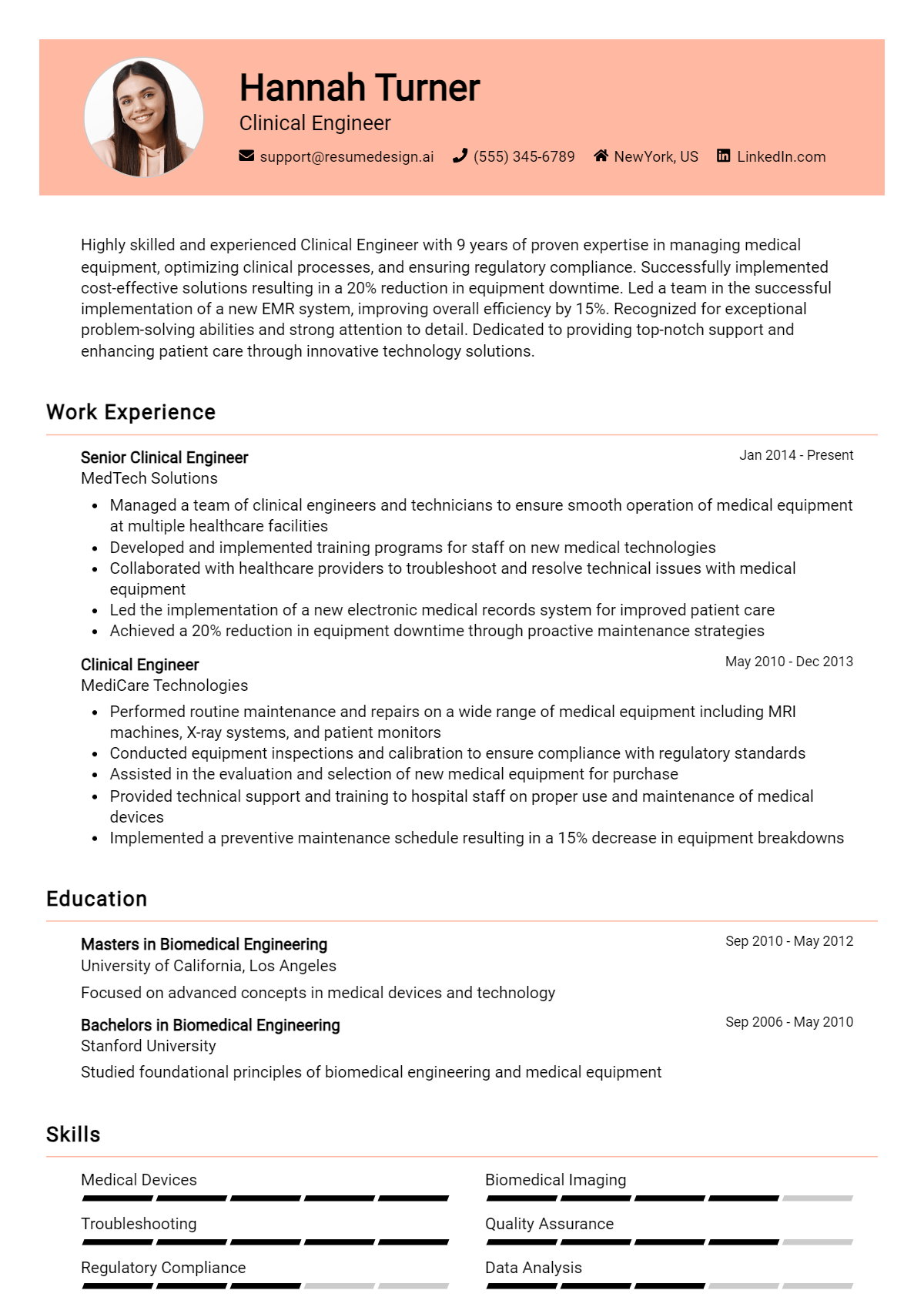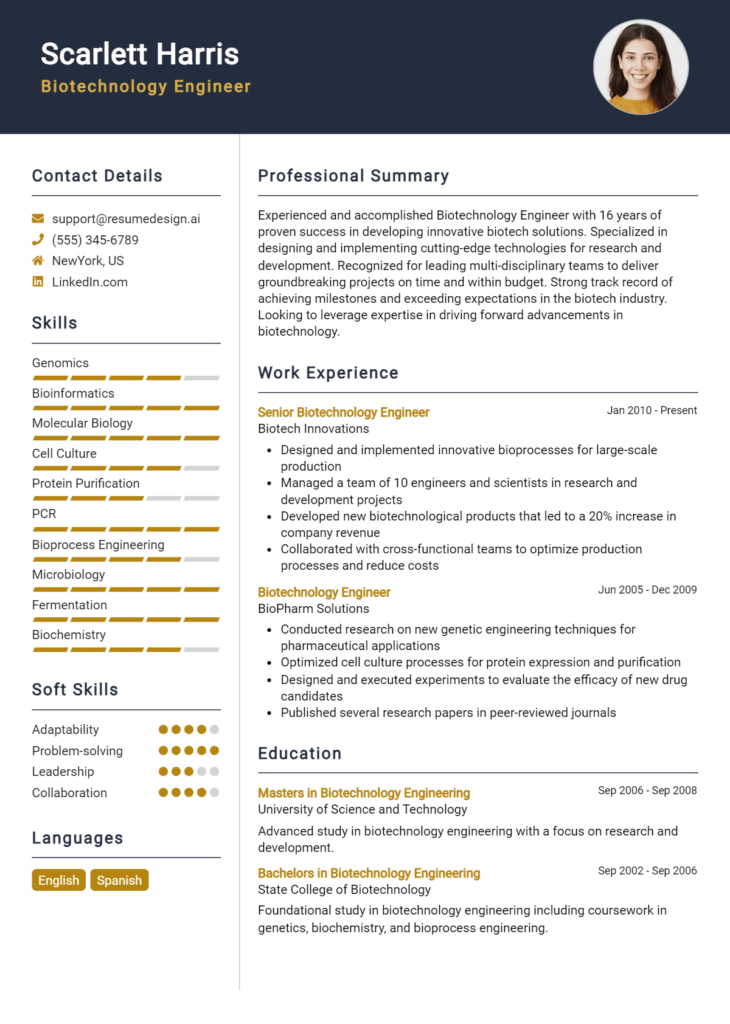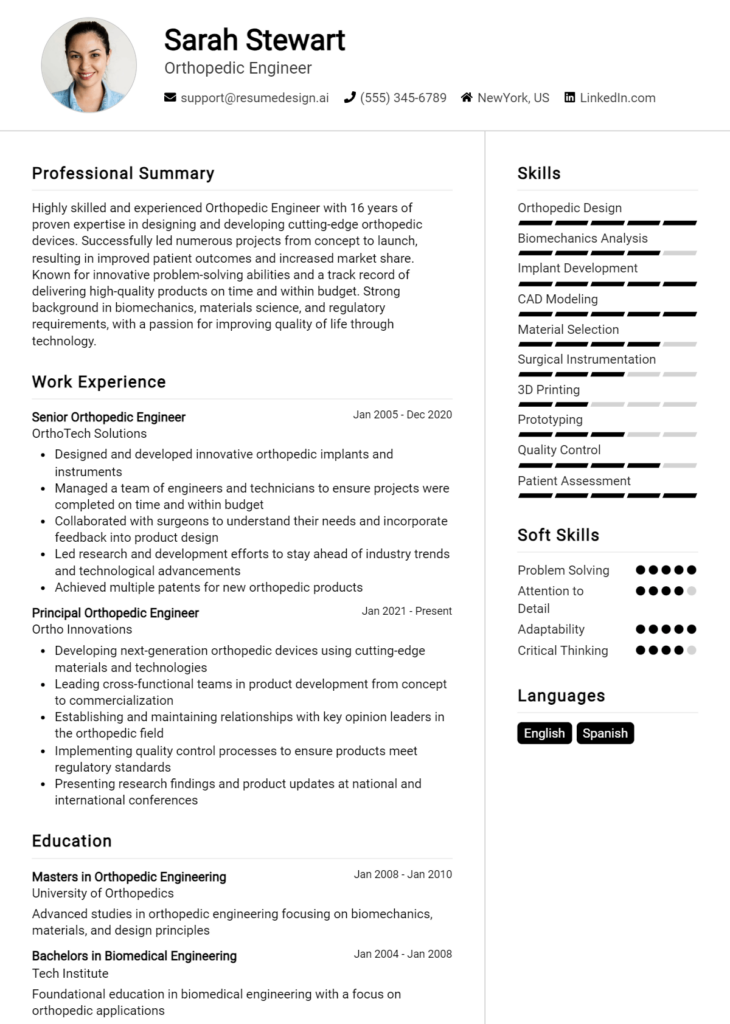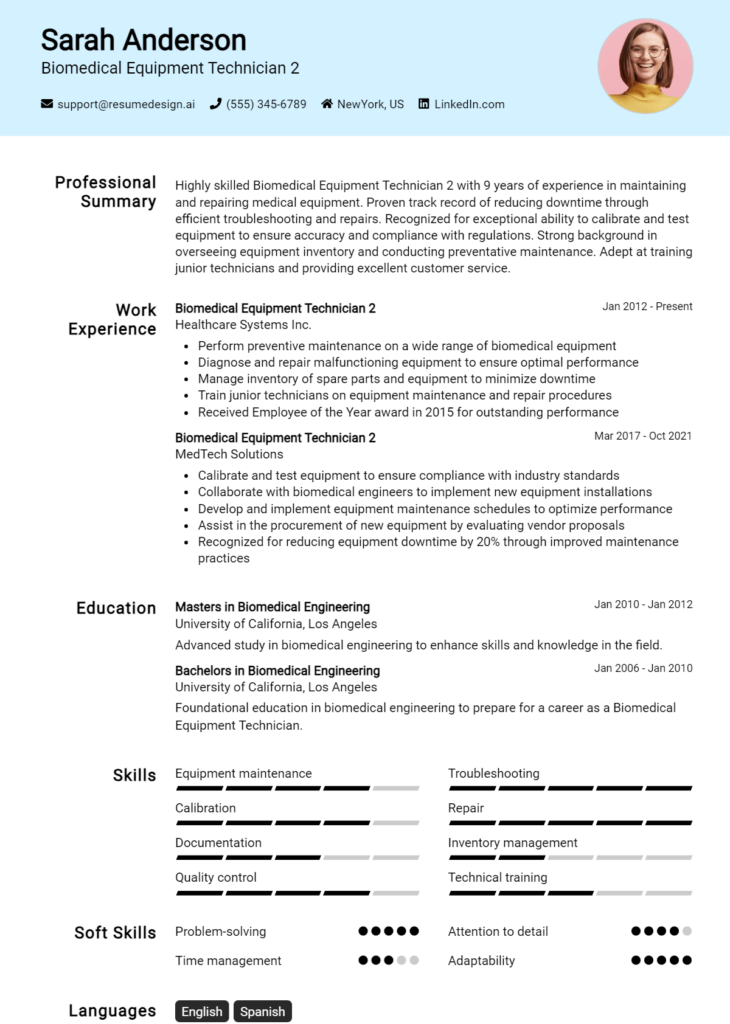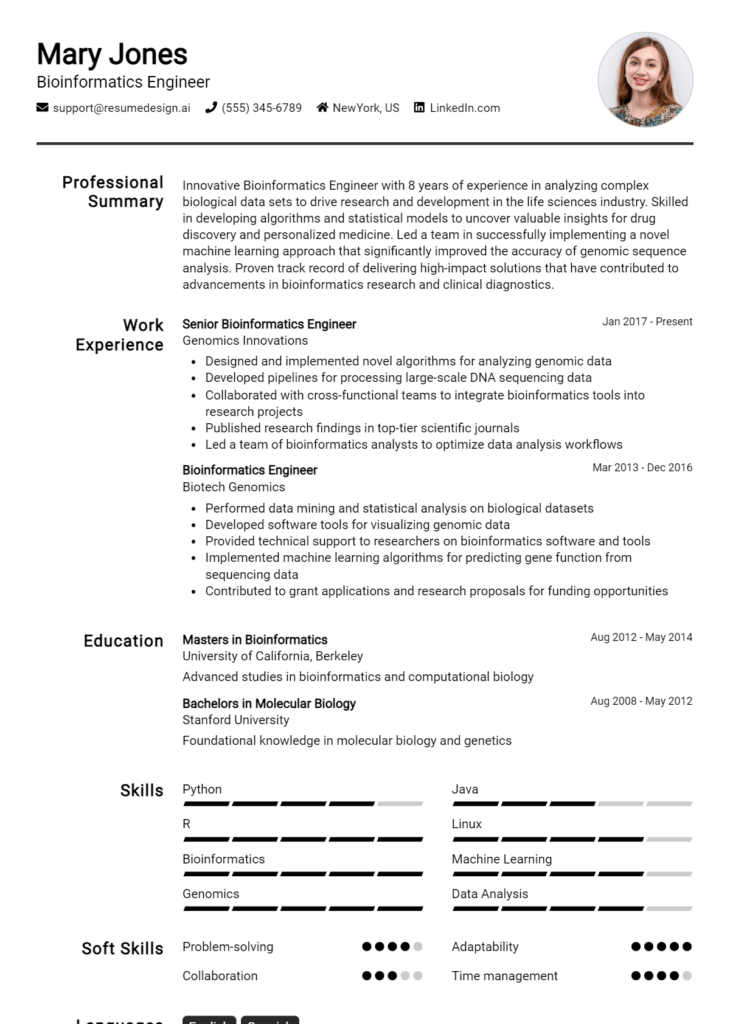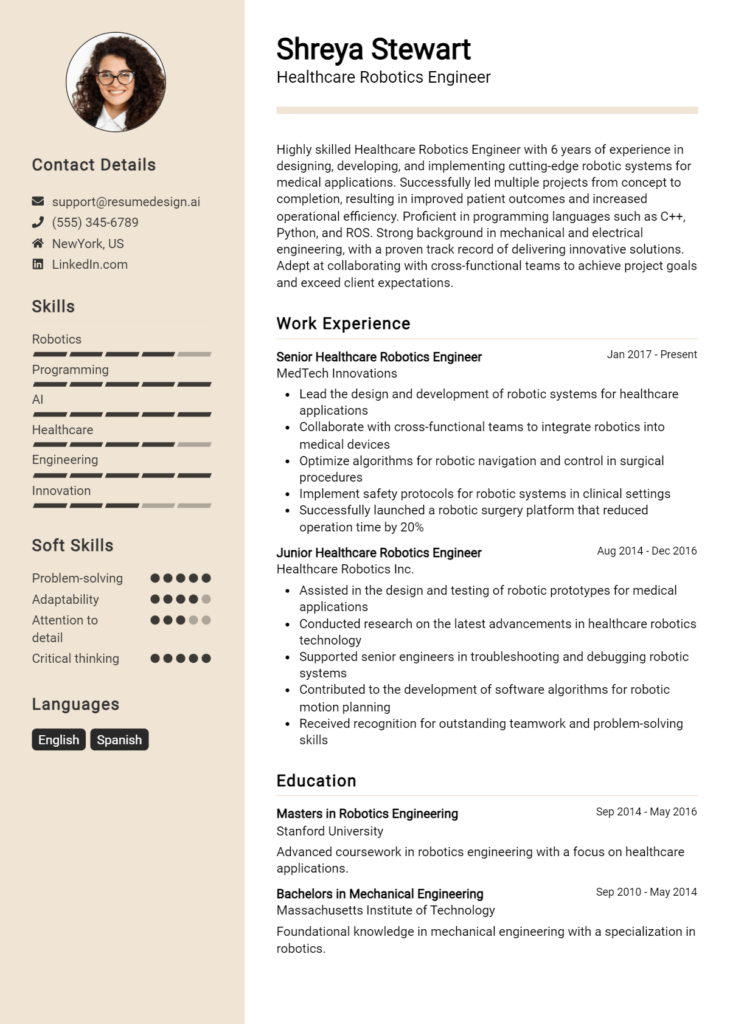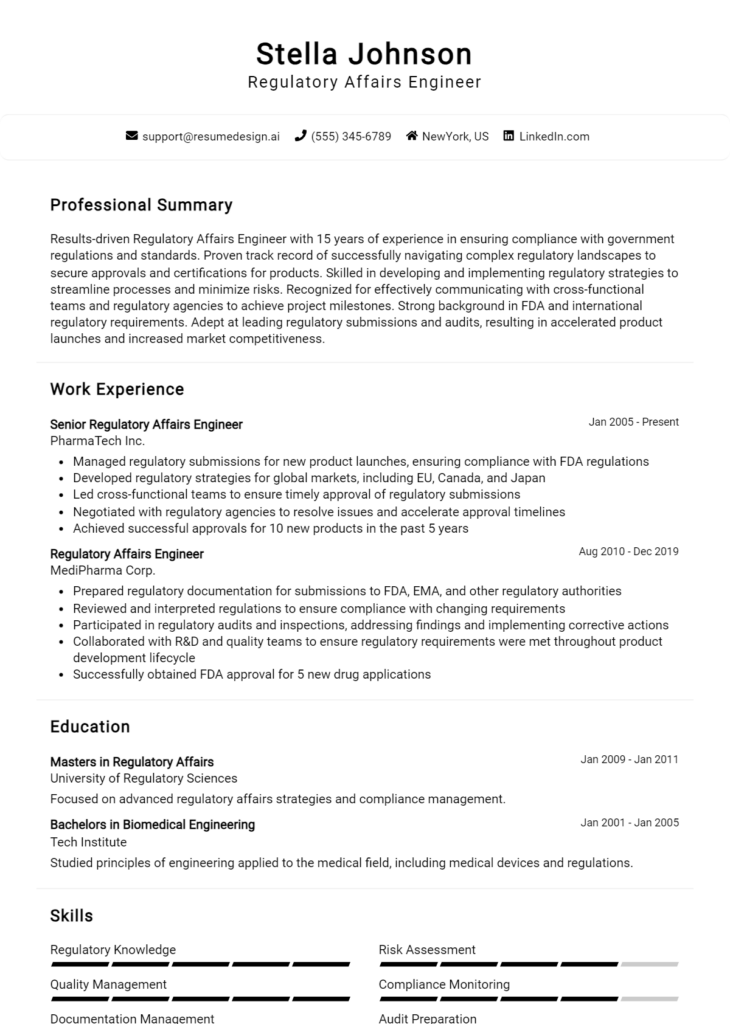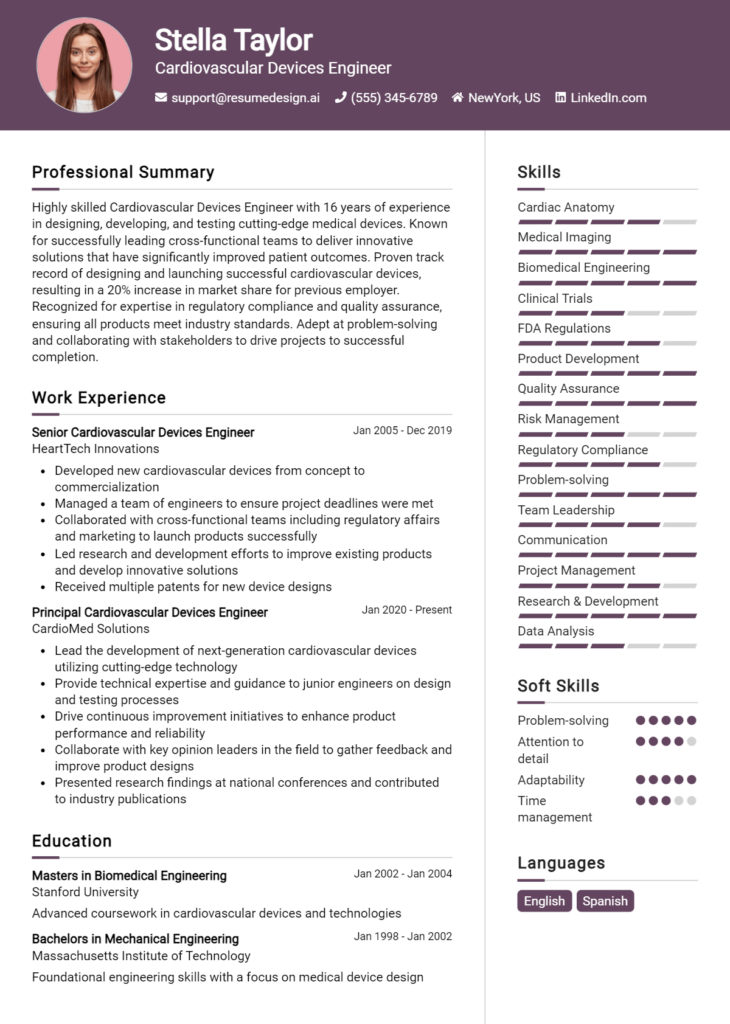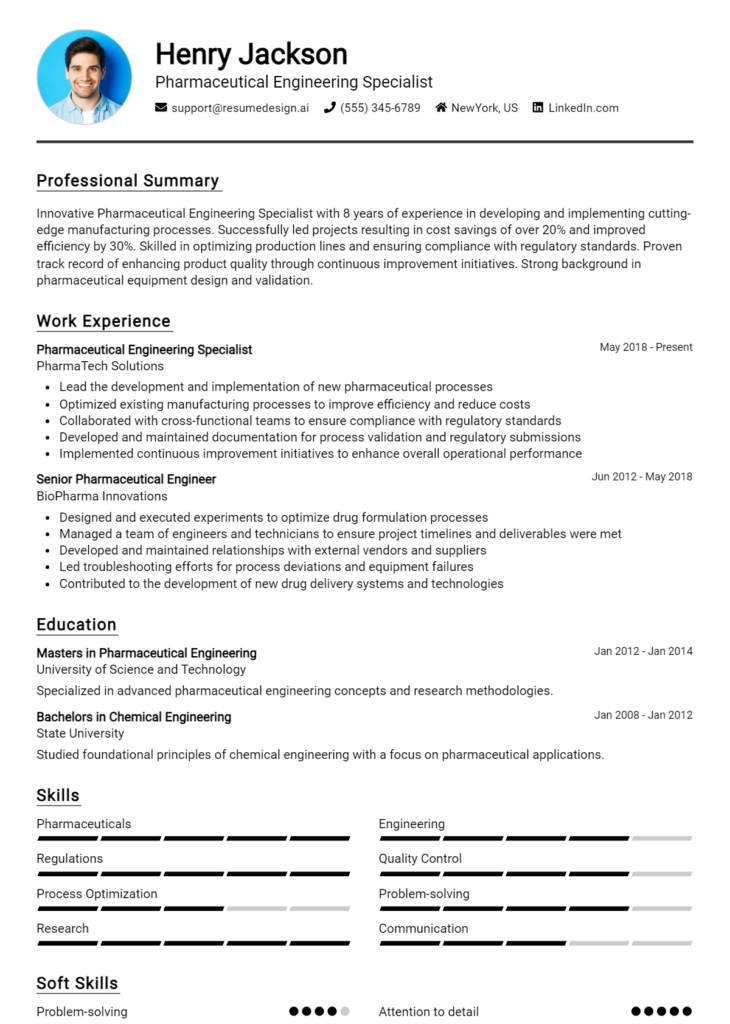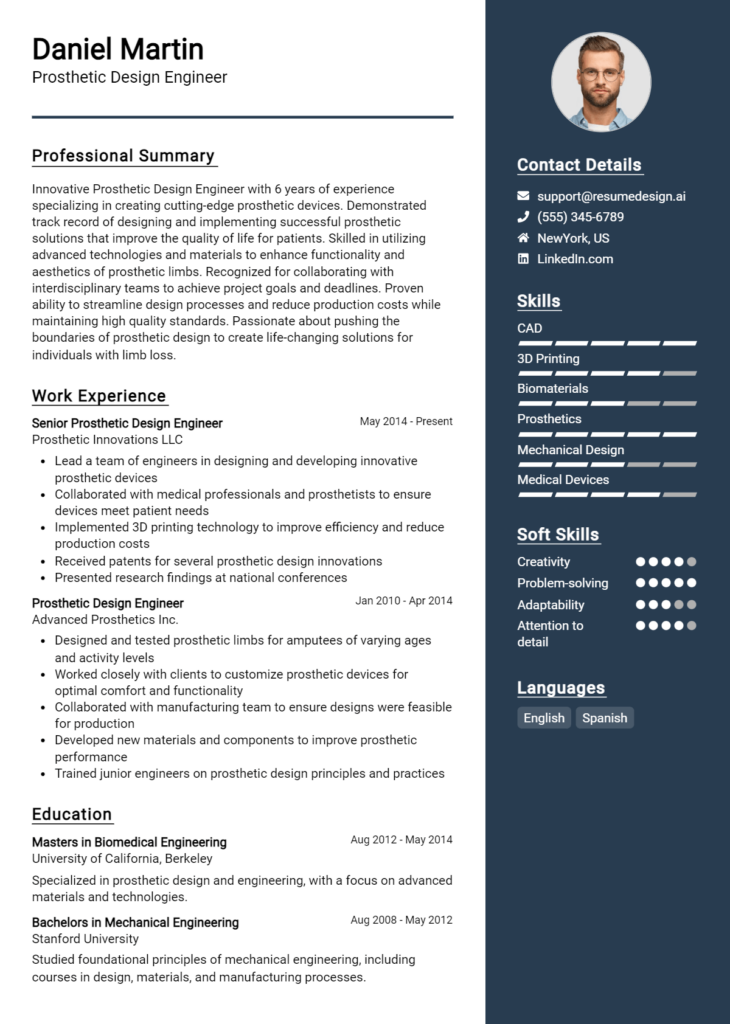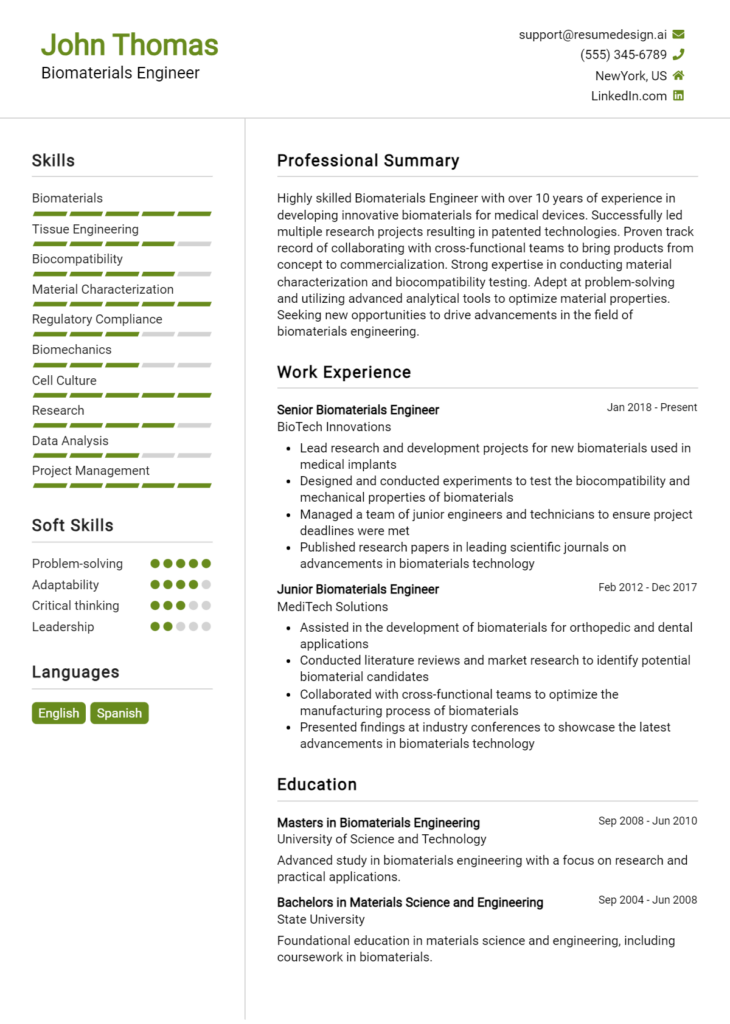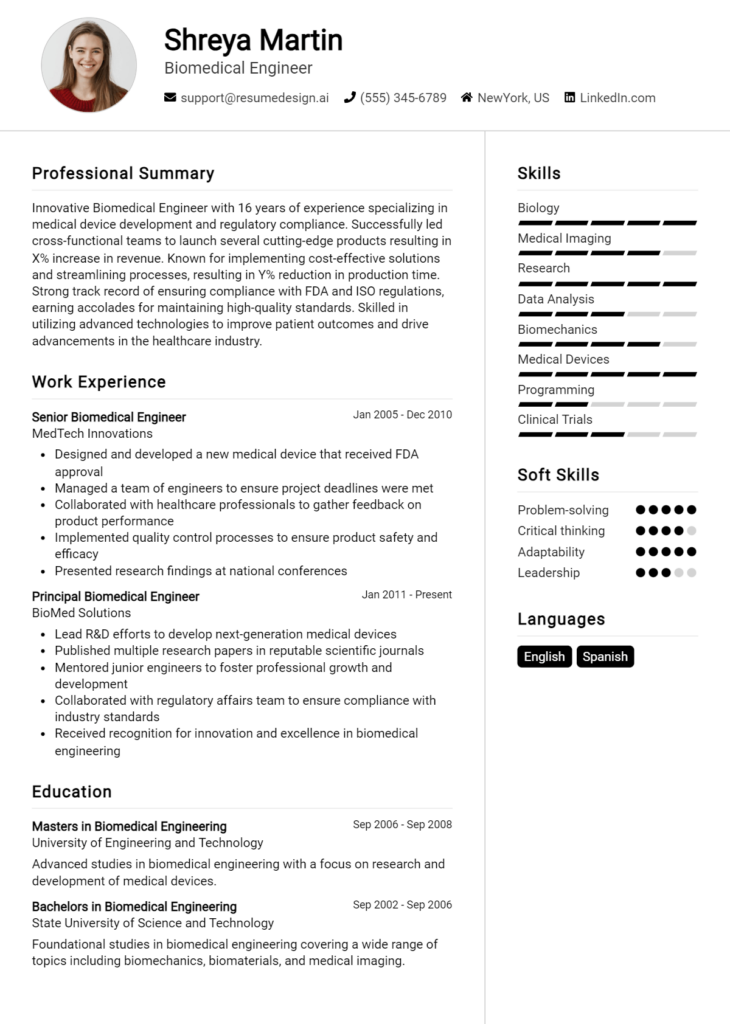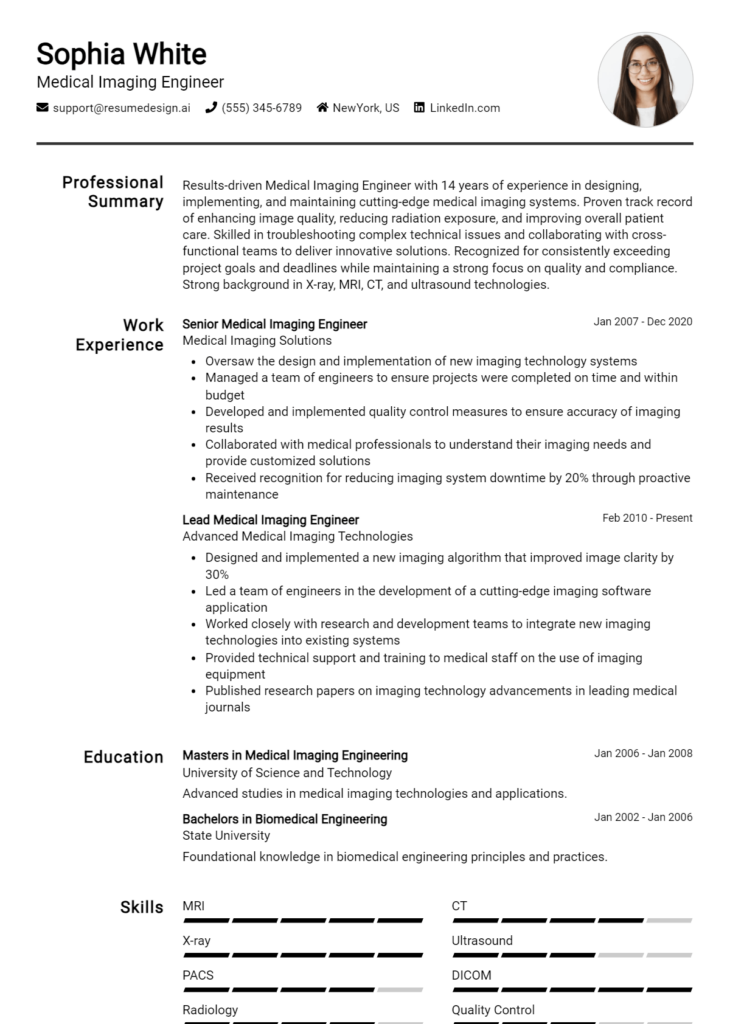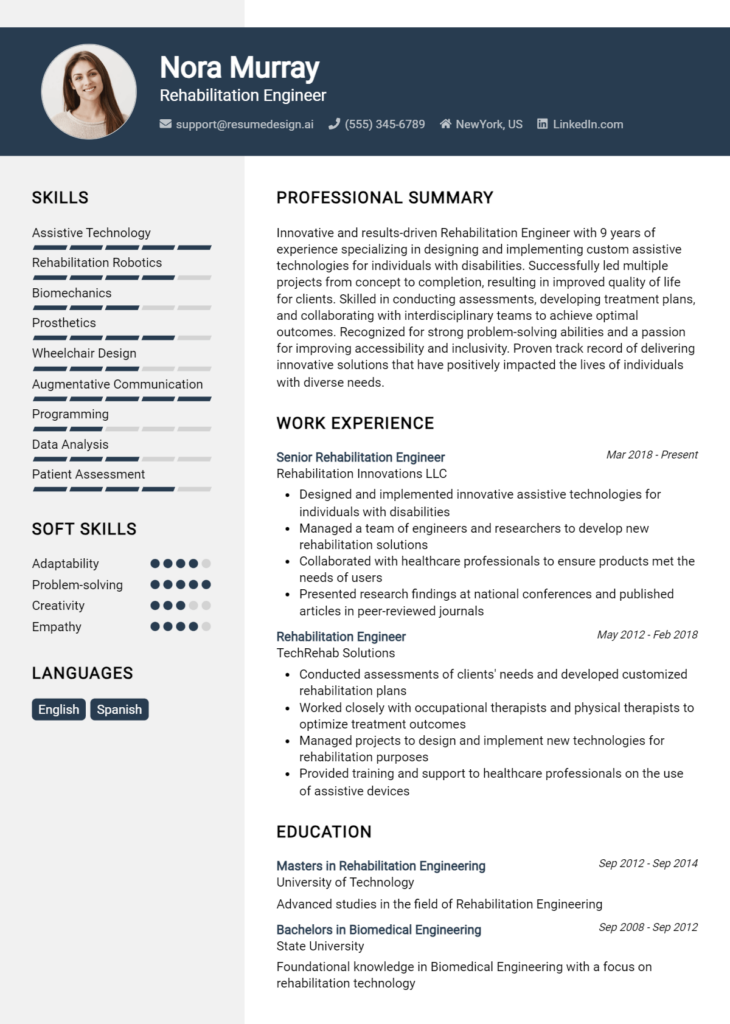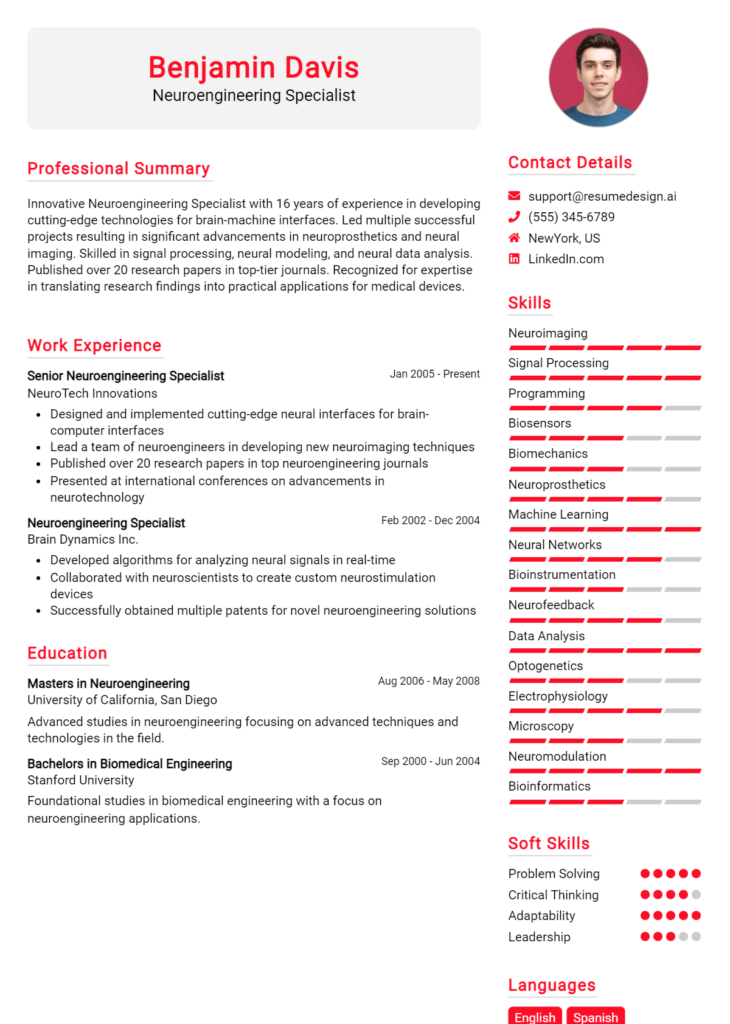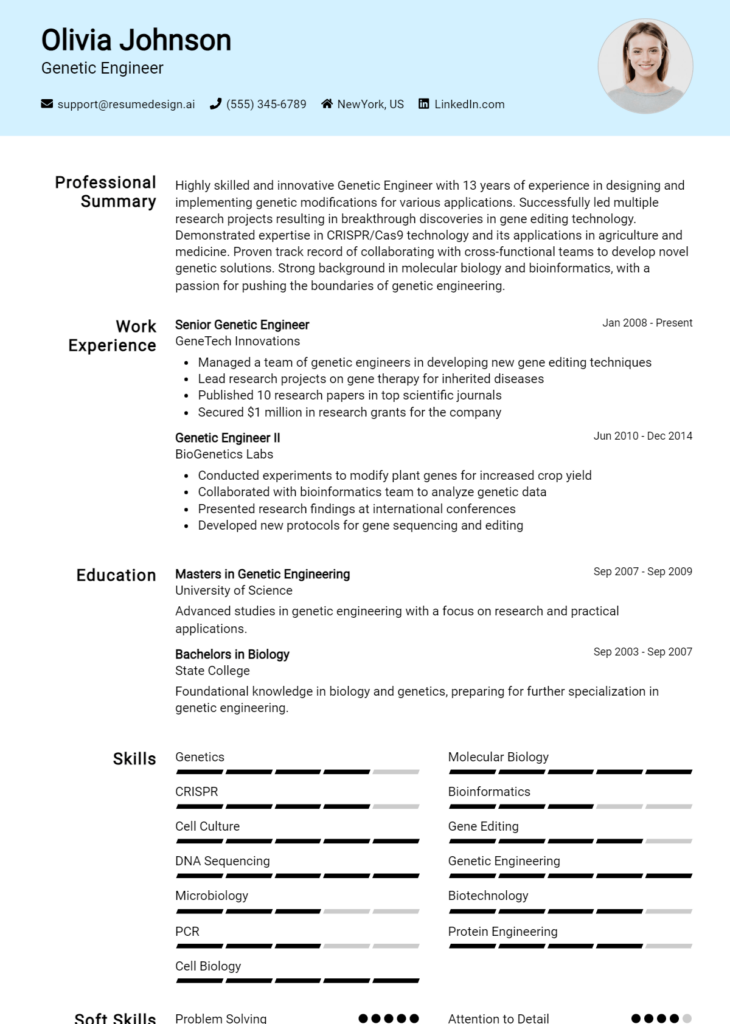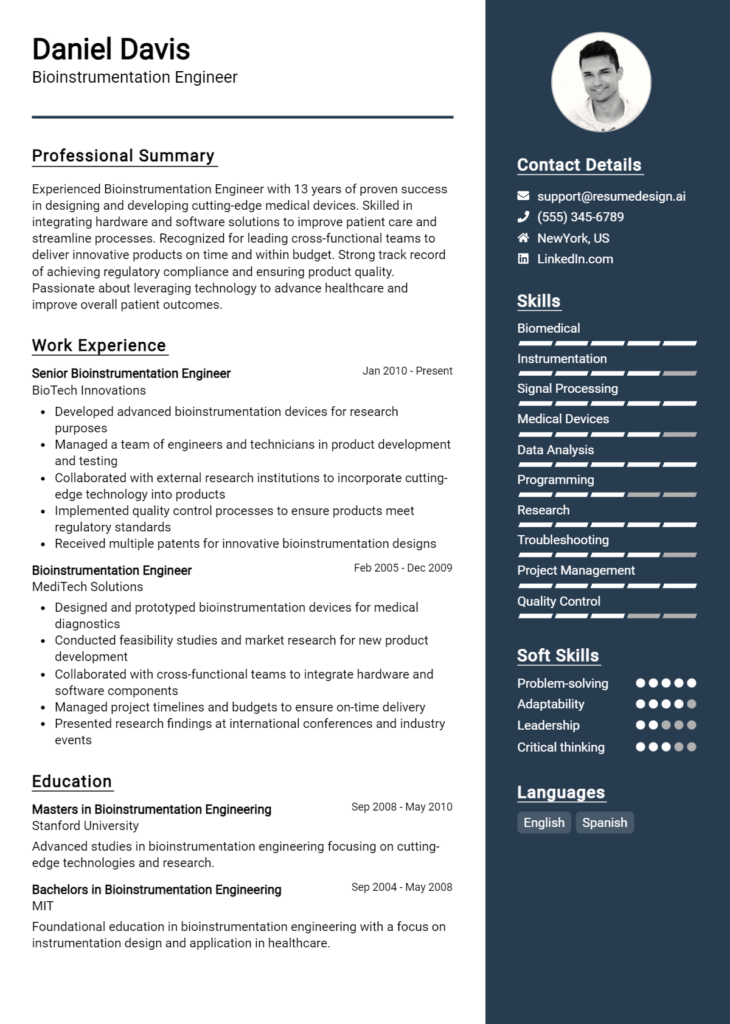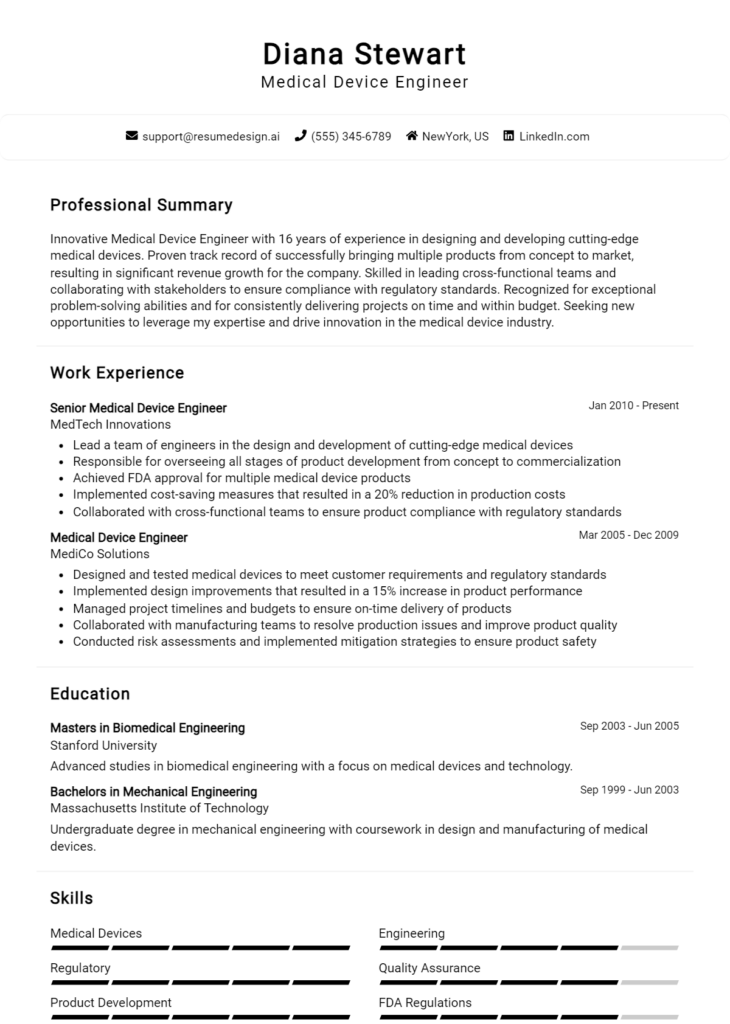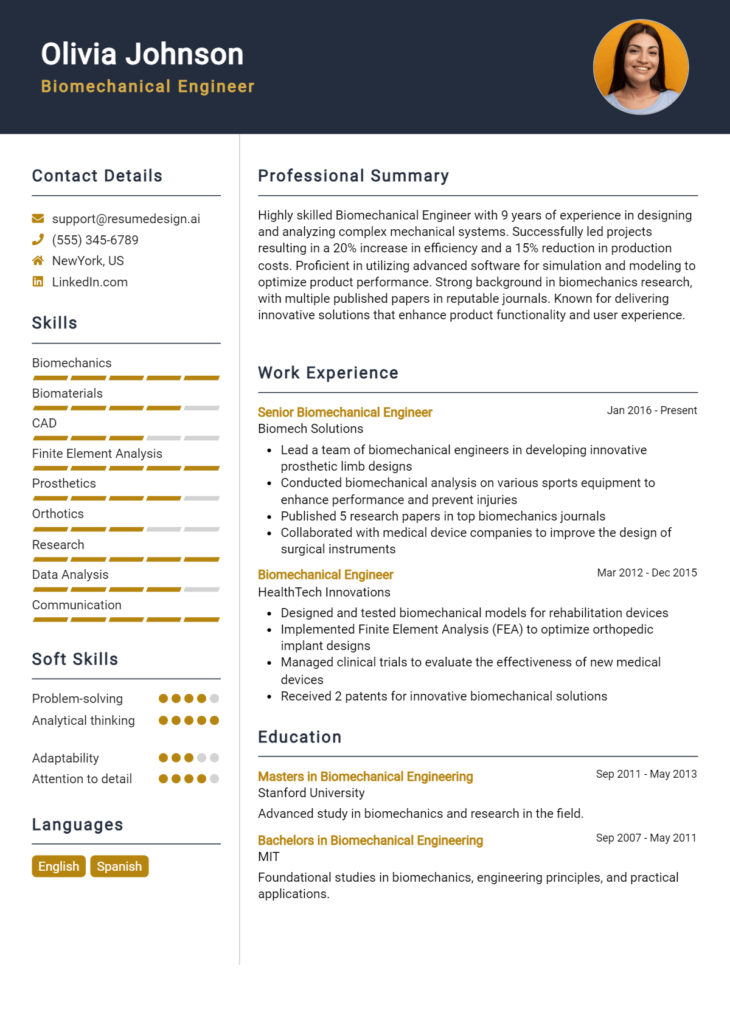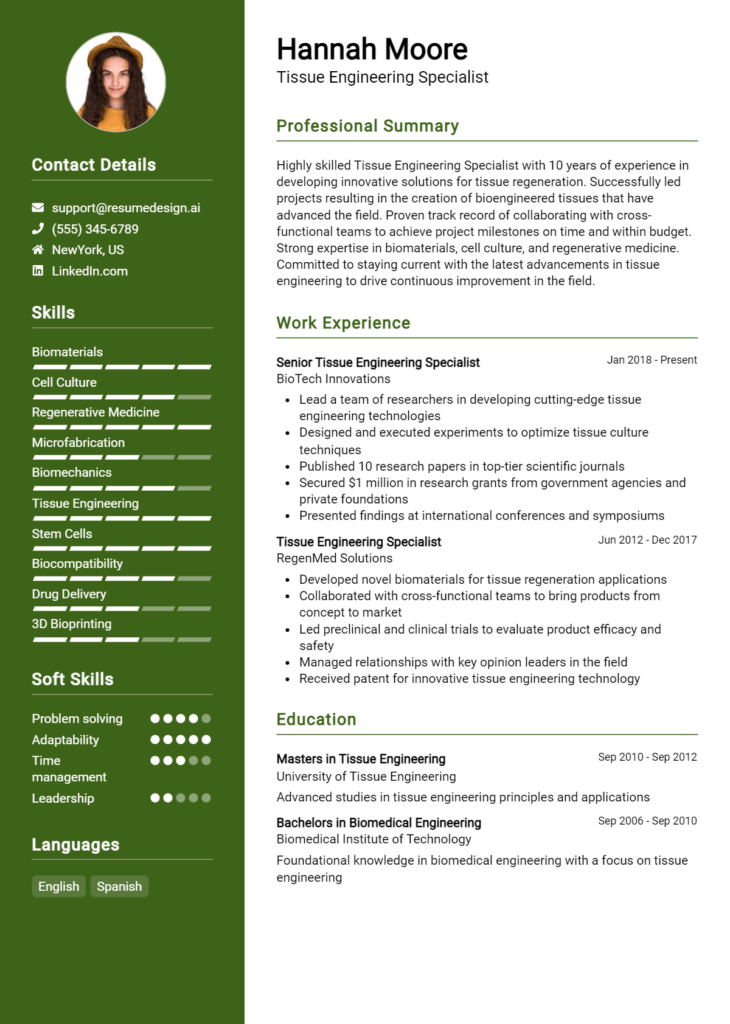Clinical Engineer Core Responsibilities
A Clinical Engineer plays a vital role in healthcare by bridging the gap between clinical and technical departments. Key responsibilities include managing medical equipment, ensuring compliance with regulations, and providing technical support to healthcare professionals. Essential skills encompass technical proficiency, operational management, and strong problem-solving abilities, all of which are crucial for enhancing patient care and optimizing equipment performance. A well-structured resume effectively highlights these qualifications, showcasing the candidate's contributions to the organization's goals.
Common Responsibilities Listed on Clinical Engineer Resume
- Manage and maintain medical equipment and devices.
- Conduct equipment evaluations and ensure regulatory compliance.
- Collaborate with clinical staff to identify technical needs.
- Provide training and support for medical device usage.
- Oversee equipment procurement and inventory management.
- Perform risk assessments and develop safety protocols.
- Implement preventive maintenance programs.
- Assist in the development of new medical technologies.
- Analyze equipment performance data for improvements.
- Coordinate with vendors for service and repairs.
- Participate in interdisciplinary team meetings.
- Maintain documentation and records for compliance audits.
High-Level Resume Tips for Clinical Engineer Professionals
In the competitive field of clinical engineering, a well-crafted resume is not just a document; it's your personal marketing tool that opens doors to new opportunities. Given that your resume is often the first impression you make on a potential employer, it must effectively reflect your skills, achievements, and experiences in a clear and concise manner. A strong resume can set you apart from other candidates, showcasing your unique qualifications and contributions to the healthcare technology landscape. This guide will provide practical and actionable resume tips specifically tailored for Clinical Engineer professionals, helping you to present your best self to prospective employers.
Top Resume Tips for Clinical Engineer Professionals
- Customize your resume for each job application by aligning your skills and experiences with the specific job description.
- Highlight relevant work experience, particularly positions that involved medical devices, systems engineering, or clinical support.
- Quantify your achievements with metrics whenever possible, such as improved equipment uptime or reduced costs.
- Showcase industry-specific skills, including knowledge of regulatory standards, risk management, and maintenance protocols.
- Include certifications relevant to clinical engineering, such as Certified Clinical Engineer (CCE) or Biomedical Equipment Technician (BMET).
- Utilize action verbs to describe your responsibilities and accomplishments, ensuring a more dynamic and engaging narrative.
- Incorporate keywords from the job description to optimize your resume for applicant tracking systems (ATS).
- Keep your resume format clean and professional, using clear headings and bullet points for easy readability.
- Consider adding a summary statement at the top that encapsulates your career highlights and key competencies.
- Proofread your resume meticulously to eliminate any spelling or grammatical errors that could detract from your professionalism.
By implementing these tailored tips, you can significantly enhance your resume's effectiveness, making it a powerful tool in your job search. A polished resume that accurately reflects your skills and accomplishments will not only capture the attention of hiring managers but also increase your chances of landing a rewarding position in the clinical engineering field.
Why Resume Headlines & Titles are Important for Clinical Engineer
In the competitive field of clinical engineering, a well-crafted resume headline or title serves as a powerful introduction that can significantly impact a candidate's chances of landing a job. A strong headline immediately grabs the attention of hiring managers, succinctly summarizing key qualifications and professional strengths in a single, impactful phrase. It is essential that the headline be concise, relevant, and directly related to the specific job being applied for, as it sets the tone for the rest of the resume and can determine whether the candidate's application will be further considered.
Best Practices for Crafting Resume Headlines for Clinical Engineer
- Keep it concise: Aim for a headline that is brief yet informative, ideally one line long.
- Be specific: Use terminology that reflects the clinical engineering field and the position you are applying for.
- Highlight key skills: Incorporate critical skills or certifications that align with the job description.
- Use action-oriented language: Start with strong action verbs to convey a sense of initiative and impact.
- Tailor for each application: Customize your headline to match the specific job requirements and company culture.
- Showcase achievements: Include quantifiable accomplishments that demonstrate your value as a clinical engineer.
- Avoid jargon: Use clear and straightforward language that can be easily understood by hiring managers.
- Maintain professionalism: Ensure the tone is formal and reflects your expertise in the field.
Example Resume Headlines for Clinical Engineer
Strong Resume Headlines
"Results-Driven Clinical Engineer with 10+ Years in Medical Device Development and Regulatory Compliance"
“Innovative Clinical Engineer Specializing in Biomedical Equipment Management and Patient Safety Solutions”
“Certified Clinical Engineer with Proven Track Record in Risk Management and Equipment Lifecycle Optimization”
Weak Resume Headlines
“Engineer Looking for Job”
“Clinical Engineer with Experience”
The strong headlines are effective because they not only convey specific qualifications and areas of expertise but also demonstrate the candidate's unique value proposition to potential employers. They are tailored, impactful, and directly relevant to the job at hand. In contrast, the weak headlines fail to impress due to their vagueness and lack of detail, leaving hiring managers with little understanding of the candidate's capabilities or suitability for the position.
Writing an Exceptional Clinical Engineer Resume Summary
A resume summary is a critical component for a Clinical Engineer as it serves as the first impression a hiring manager receives about a candidate. A well-crafted summary quickly captures attention by effectively highlighting key skills, relevant experience, and notable accomplishments tailored to the specific job role. This concise and impactful section not only showcases the candidate's qualifications but also demonstrates their understanding of the position, making it easier for hiring managers to assess their fit for the role at a glance.
Best Practices for Writing a Clinical Engineer Resume Summary
- Quantify Achievements: Use numbers and metrics to highlight your accomplishments and make your impact clear.
- Focus on Skills: Identify and emphasize relevant technical and soft skills that align with the job description.
- Tailor for the Job: Customize your summary for each application to reflect the specific requirements and responsibilities of the role.
- Be Concise: Keep your summary brief—ideally, 2-4 sentences that deliver your message effectively.
- Use Action Verbs: Start sentences with strong action verbs to convey confidence and proactivity.
- Showcase Relevant Experience: Highlight your specific experience in clinical engineering or related fields that make you a strong candidate.
- Reflect Professional Aspirations: Briefly touch on your career goals to demonstrate alignment with the potential employer’s mission.
- Maintain Clarity: Avoid jargon and complex language; ensure your summary is easy to understand.
Example Clinical Engineer Resume Summaries
Strong Resume Summaries
Results-driven Clinical Engineer with over 5 years of experience in designing and implementing medical device solutions, achieving a 30% reduction in equipment downtime through proactive maintenance strategies.
Dedicated Clinical Engineer skilled in biomedical equipment management and regulatory compliance, successfully led a cross-functional team to improve device safety protocols, resulting in a 25% decrease in incident reports.
Innovative Clinical Engineer with a robust background in healthcare technology integration, recognized for enhancing patient outcomes by developing systems that increased diagnostic accuracy by 40% within one year.
Weak Resume Summaries
Experienced engineer looking for a job in the healthcare field.
Clinical Engineer with some experience and skills in technology.
The examples of strong resume summaries demonstrate a clear connection to the Clinical Engineer role, showcasing measurable achievements, specific skills, and relevant experience. In contrast, the weak summaries lack detail and fail to provide concrete examples of the candidate's capabilities or impact, making them less compelling to hiring managers.
Work Experience Section for Clinical Engineer Resume
The work experience section of a Clinical Engineer resume is crucial as it serves as a testament to the candidate's technical proficiency and ability to manage teams effectively. This section not only highlights the candidate's hands-on experience with medical devices and technology but also showcases their capacity to deliver high-quality products within healthcare settings. By quantifying achievements and aligning experiences with industry standards, candidates can present themselves as valuable assets to potential employers, demonstrating their commitment to excellence and innovation in clinical engineering.
Best Practices for Clinical Engineer Work Experience
- Highlight relevant technical skills specific to medical devices and systems.
- Quantify achievements with metrics, such as improved system efficiency or reduced downtime.
- Emphasize collaboration with multidisciplinary teams to enhance patient care and safety.
- Detail leadership roles in project management and team coordination.
- Showcase familiarity with regulatory standards and compliance in healthcare technology.
- Include continuous education or certifications that enhance technical capabilities.
- Tailor each experience to reflect the job description and industry trends.
- Use action verbs to convey initiative and impact in previous roles.
Example Work Experiences for Clinical Engineer
Strong Experiences
- Led a cross-functional team of 10 in the successful implementation of a new patient monitoring system, resulting in a 30% reduction in response time to critical alerts.
- Developed and executed a preventive maintenance program for over 200 medical devices, achieving a 95% compliance rate and reducing equipment downtime by 40%.
- Collaborated with IT and clinical staff to integrate electronic health records with imaging systems, improving data accessibility and patient outcomes by 25%.
- Managed the evaluation and procurement of a new surgical robot, which improved surgical precision and reduced patient recovery time by 15%.
Weak Experiences
- Worked on various medical devices.
- Assisted in maintenance tasks.
- Participated in team meetings.
- Helped with compliance checks.
The examples provided illustrate the distinction between strong and weak work experiences. Strong experiences are characterized by specific achievements, quantifiable outcomes, and clear indications of leadership and collaboration. In contrast, weak experiences lack detail and fail to convey the impact of the candidate's contributions, making them less compelling to potential employers.
Education and Certifications Section for Clinical Engineer Resume
The education and certifications section of a Clinical Engineer resume is crucial as it showcases the candidate's academic background and their commitment to professional development in the healthcare technology field. This section not only highlights relevant degrees and specialized training but also underscores industry-recognized certifications that validate the candidate's expertise. Including pertinent coursework and ongoing educational endeavors reflects a dedication to continuous learning, which is essential in keeping up with rapidly evolving medical technologies. By presenting this information effectively, candidates can enhance their credibility and demonstrate alignment with the expectations of the clinical engineering role.
Best Practices for Clinical Engineer Education and Certifications
- Prioritize relevant degrees, such as Biomedical Engineering or Clinical Engineering, at the top of the section.
- Include industry-recognized certifications, such as Certified Clinical Engineer (CCE) or Certified Biomedical Equipment Technician (CBET).
- Provide details on specialized training programs or workshops that are directly applicable to clinical engineering.
- List relevant coursework that showcases skills in areas like medical device design, regulatory standards, and risk management.
- Highlight any ongoing education efforts, such as online courses or professional development seminars.
- Be specific about the institutions attended and the dates of graduation or certification completion.
- Use clear, concise language to make the information easy to read and understand.
- Tailor the section to include only the most relevant qualifications that align with the job description.
Example Education and Certifications for Clinical Engineer
Strong Examples
- Bachelor of Science in Biomedical Engineering, University of XYZ, 2020
- Certified Clinical Engineer (CCE), 2021
- Advanced Medical Device Design, Online Course, 2022
- Master of Science in Clinical Engineering, University of ABC, Expected 2023
Weak Examples
- Bachelor of Arts in English Literature, University of DEF, 2018
- Certification in Basic Computer Skills, 2019
- High School Diploma, 2016
- Online Course in Photography Basics, 2021
The examples provided illustrate the distinction between strong and weak qualifications. Strong examples are directly relevant to the clinical engineering field, showcasing specialized education and recognized certifications that align with industry standards. In contrast, weak examples reflect qualifications that do not pertain to the role, such as degrees in unrelated fields or certifications that lack relevance to clinical engineering. This contrast emphasizes the importance of including only those credentials that enhance the candidate’s fit for the position.
Top Skills & Keywords for Clinical Engineer Resume
In the dynamic field of healthcare, a Clinical Engineer plays a crucial role in ensuring that medical equipment is safe, effective, and properly maintained. As technology continues to advance, having the right skills on a Clinical Engineer resume becomes essential for demonstrating competence and value to potential employers. Skills not only highlight a candidate’s technical proficiency but also showcase their ability to collaborate with healthcare professionals, troubleshoot complex problems, and contribute to patient care. A well-crafted resume that emphasizes both hard and soft skills can set a Clinical Engineer apart in a competitive job market.
Top Hard & Soft Skills for Clinical Engineer
Soft Skills
- Excellent communication skills
- Team collaboration and leadership
- Problem-solving and critical thinking
- Adaptability and flexibility
- Attention to detail
- Time management
- Empathy and patient-centered approach
- Project management
- Analytical thinking
- Conflict resolution
Hard Skills
- Proficiency in biomedical equipment management
- Knowledge of medical electrical equipment standards (e.g., IEC 60601)
- Experience with medical device software and firmware
- Familiarity with regulatory compliance (e.g., FDA, ISO)
- Proficient in data analysis and statistical software
- Understanding of clinical workflows and processes
- Skills in troubleshooting and repair of medical devices
- Knowledge of risk management in healthcare
- Experience with inventory management systems
- Familiarity with imaging systems and technologies
For a comprehensive overview of the skills you can include, consider reviewing additional resources on skills. Likewise, when detailing your relevant experience, be sure to explore insights on work experience that can further enhance your resume.
Stand Out with a Winning Clinical Engineer Cover Letter
Dear [Hiring Manager's Name],
I am writing to express my interest in the Clinical Engineer position at [Company Name] as advertised on [Job Board/Company Website]. With a robust background in biomedical engineering and extensive experience managing medical device technologies, I am excited about the opportunity to contribute to your team. My passion for improving patient outcomes through innovative engineering solutions aligns perfectly with [Company Name]'s commitment to excellence in healthcare.
In my previous role at [Previous Company Name], I successfully led the implementation of a new medical imaging system that improved diagnostic accuracy while reducing operational costs by 20%. My responsibilities included conducting thorough risk assessments, ensuring compliance with regulatory standards, and collaborating with clinical staff to enhance user experience. This experience honed my skills in troubleshooting, maintenance, and training, which are critical for a Clinical Engineer. I am adept at translating complex technical concepts into actionable strategies, enabling healthcare professionals to utilize technology effectively and efficiently.
Moreover, I am dedicated to continuous learning and staying updated on the latest advancements in medical technology. I hold certifications in [relevant certifications] and regularly participate in professional development workshops. I believe that my strong analytical skills, attention to detail, and ability to work collaboratively with multidisciplinary teams make me a valuable asset to your organization. I am eager to bring my expertise to [Company Name] and contribute to the innovative solutions that enhance patient care.
Thank you for considering my application. I look forward to the opportunity to discuss how my qualifications and enthusiasm for clinical engineering can align with the goals of [Company Name]. I am excited about the possibility of contributing to your team and am available for an interview at your earliest convenience.
Sincerely,
[Your Name]
[Your Phone Number]
[Your Email Address]
Common Mistakes to Avoid in a Clinical Engineer Resume
Crafting a resume as a Clinical Engineer requires attention to detail and a clear representation of your skills and experiences. However, many candidates make common mistakes that can detract from their qualifications and fail to capture the attention of hiring managers. By avoiding these pitfalls, you can create a more effective resume that showcases your expertise in the clinical engineering field.
Vague Job Descriptions: Failing to provide specific details about your responsibilities and achievements can make your experience seem less impactful. Use quantifiable results and specific projects to demonstrate your contributions.
Ignoring Keywords: Many employers use applicant tracking systems (ATS) that filter resumes based on keywords. Not including relevant industry terms can result in your resume being overlooked.
Overloading with Technical Jargon: While it's important to demonstrate your technical knowledge, excessive jargon can confuse non-technical hiring managers. Strive for a balance that is accessible yet still showcases your expertise.
Neglecting Soft Skills: Clinical Engineers must often collaborate with healthcare teams and communicate effectively with non-technical staff. Omitting soft skills, such as teamwork and communication, can give an incomplete picture of your capabilities.
Using an Unprofessional Email Address: An unprofessional email can leave a negative first impression. Stick to a simple format, ideally combining your name and a professional domain.
Lack of Tailoring for Each Application: Sending out the same resume for every application can be detrimental. Tailor your resume to highlight the most relevant experiences and skills for each position you apply for.
Failure to Include Certifications: Certifications specific to clinical engineering can enhance your credibility. Ensure you list all relevant certifications prominently on your resume.
Ignoring the Format and Layout: A cluttered or overly complex format can make your resume difficult to read. Use clear headings, bullet points, and a consistent layout to enhance readability and professionalism.
Conclusion
As a Clinical Engineer, your role is pivotal in ensuring that medical devices and technologies are safe, effective, and compliant with regulations. You are responsible for managing equipment, conducting maintenance, and collaborating with healthcare professionals to enhance patient care. Key competencies include technical knowledge, problem-solving skills, and an understanding of regulatory standards. Additionally, staying updated with technological advancements is crucial for success in this ever-evolving field.
In conclusion, it’s essential to present your skills and experiences effectively in your resume to stand out in the competitive job market. Take the time to review and refine your Clinical Engineer resume to highlight your relevant achievements and expertise. Utilize the available resources, such as resume templates, resume builder, resume examples, and cover letter templates, to create a polished and professional application that showcases your qualifications. Start enhancing your resume today and take the next step in your career!

